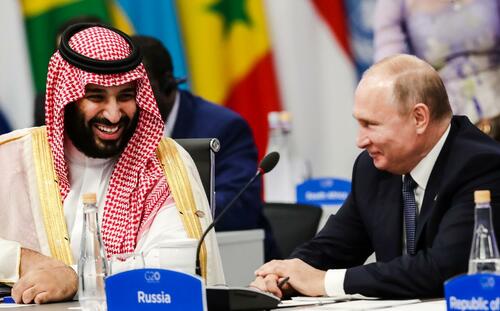Biden’s Secret Promise To OPEC Backfires: Shellenberger
Submitted by Michael Shellenberger,
In early September, United States Secretary of Energy, Jennifer Granholm, told Reuters that President Joe Biden was considering extending the release of oil from America’s emergency stockpiles, the Strategic Petroleum Reserve (SPR), through October, and thus beyond the date when the program had been set to end. But then, a few hours later, an official with the Department of Energy called Reuters and contradicted Granholm, saying that the White House was not, in fact, considering more SPR releases. Five days later, the White House said it was considering refilling the SPR, thereby proposing to do the exact opposite of what Granholm had proposed.
The confusion around the Biden administration’s petroleum policy was cleared up yesterday after a senior official revealed that the White House had made a secret offer to buy up to 200 million barrels of OPEC+ oil to replenish the SPR in exchange for OPEC+ not cutting oil production. The official said the White House wanted to reassure OPEC+ that the US “won’t leave them hanging dry.” The fact that this offer was made through the White House, not the Department of Energy, may explain why a representative of the Department called Reuters to take back the remarks of Granholm, who has shown herself to be out-of-the-loop, and at a loss for words, relating to key administration decisions relating to oil and gas production.
The revelation poses political risks for Democrats who, in the spring of 2020, killed a proposal by President Donald Trump to replenish the SPR with oil from American producers, not OPEC+ ones, and at a price of $24 a barrel, not the $80 a barrel that the Biden White House promised to OPEC+. At the time, Trump was seeking to stabilize the American oil industry after the Covid-19 pandemic massively reduced oil demand. Trump and Congressional Republicans proposed spending $3 billion to fill the SPR. Senate Democratic Leader Chuck Schumer successfully defeated the proposal, and later bragged that his party had blocked a “bailout for big oil.”
Even normally strong boosters of the Biden White House viewed the Democrats’ opposition to refilling the SPR as a major blunder. “That decision,” noted Bloomberg, “effectively cost the US billions in potential profits and meant Biden had tens of millions of fewer barrels at his disposal with which to counter price surges.” Moreover, observed Bloomberg, it will take significantly more oil today to fill the SPR than it would have two years ago. In spring 2020, the SPR contained 634 million barrels out of a capacity of 727 million. Now, the reserve is below 442 million barrels, its lowest level in 38 years.
The decision looks even worse in light of the decision by OPEC+ today to cut production, which will increase oil prices. The Biden administration in recent days has been pulling out the stops trying to persuade Saudi Arabia and other OPEC+ members, a group that includes Russia, to maintain today’s levels of oil production. Last Friday, the Biden administration sought a 45-day delay in a civil court proceeding over whether Saudi Arabia’s Crown Prince Mohammed bin Salman should have sovereign immunity for the murder of Washington Post columnist Jamal Khashoggi, for which bin Salman has taken responsibility.
The behavior by the Biden White House displays a willingness to sacrifice America’s commitment to human rights for the president’s short-term political needs. Instead of pleading with OPEC+ to maintain or increase high levels of oil production, the Biden administration could have simply allowed for expanded domestic oil production. Instead, Biden has issued fewer leases for on-shore and off-shore oil production than any president since World War II. As such, the pleadings by Biden and administration officials have backfired. The perception of the U.S. in the minds of OPEC+ members has weakened while the influence of Russian President Vladimir Putin has strengthened.
Why is that? Why did the Biden administration decide to spend so much political capital trying, and failing, to get Saudi Arabia and other OPEC+ members to expand production when it could have simply expanded oil production domestically? What, exactly, is going on?
President Joe Biden greets the Saudi Crown Prince on July 15, 2022.
Substack subscribers can click here to read more…
Tyler Durden
Thu, 10/06/2022 – 22:20

